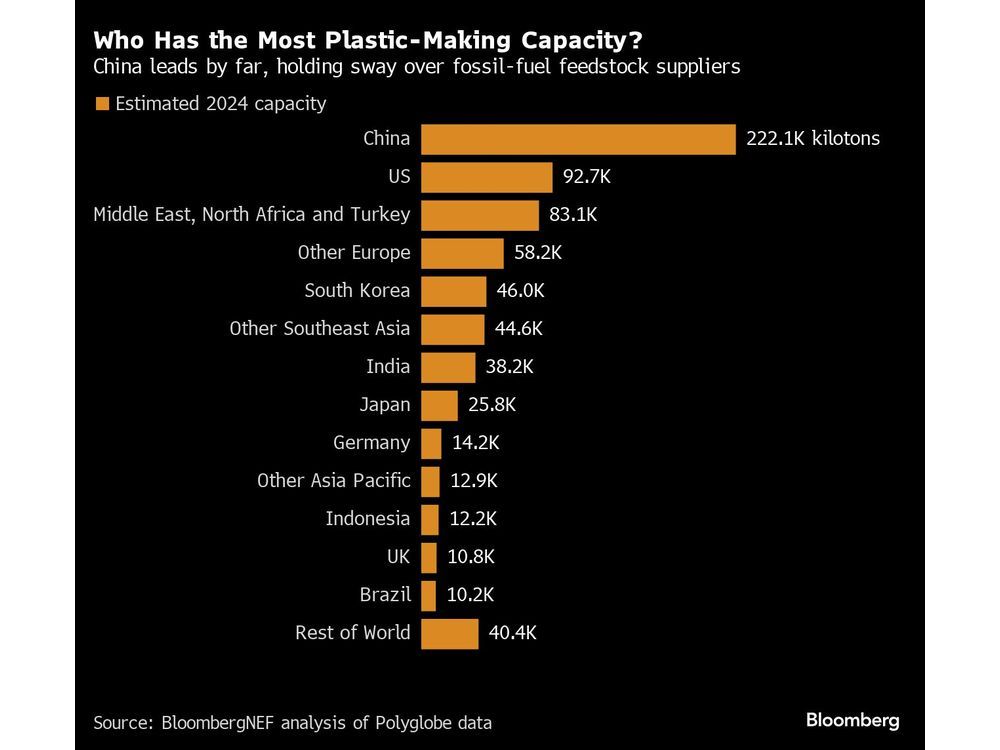Top Stories
UN Talks on Plastic Treaty Resume Amid Urgent Health Warnings

UPDATE: As UN diplomats gather today in Switzerland for the sixth round of crucial treaty negotiations on plastic pollution, new alarming research has surfaced, highlighting an urgent health crisis linked to plastic use. A recent study published in The Lancet estimates that plastic pollution incurs over $1.5 trillion annually in health-related economic costs, emphasizing the growing dangers posed by plastic to both humanity and the planet.
Despite escalating evidence and calls for action, the path to a global agreement appears more fragmented than ever. The negotiations, which follow a failed attempt to finalize a treaty in Busan, South Korea last winter, reveal deep-rooted divisions among participating nations. Some countries advocate for a comprehensive treaty that would cap new plastic production and restrict harmful chemicals, while others prefer a limited focus on enhancing waste collection and recycling efforts.
Erin Simon, vice president of the World Wildlife Fund, warns that the ongoing division between nations is likely to persist during these talks. “I do see that division persisting,” Simon stated, highlighting the challenge of reaching a consensus amidst shifting political landscapes.
The discussions also come at a pivotal moment, with leadership changes influencing national policies. The recent re-election of US President Donald Trump has raised concerns, as his administration favors increased fossil fuel extraction—the primary source of plastic production. A spokesperson from the US State Department confirmed the country’s stance, stating they support an agreement “that respects national sovereignty” without imposing stringent limitations on producers.
Jessica Roff, campaign manager at the Global Alliance for Incinerator Alternatives (GAIA), criticized the US position, calling it “disappointing.” She asserted, “The only way to effectively address the plastic crisis around the world is to have a legally binding treaty with production reduction at its core.”
As the talks unfold, the scientific community’s alarms continue to grow louder. The Organisation for Economic Co-operation and Development (OECD) reports that global plastic production doubled from 234 million tons in 2000 to 460 million tons in 2019, with projections indicating a staggering 736 million tons by 2040 if current trends persist.
Compounding these concerns, a recent study revealed that over one-fourth of the 16,000 chemicals found in plastics are known to be hazardous to human health, with many more yet to be tested for toxicity. Health risks linked to plastic exposure include reproductive issues, developmental impairments in children, and increased cancer and stroke risks in adults.
Additionally, new research indicates that adult humans inhale an estimated 68,000 microplastic fragments daily, significantly higher than previous estimates. The presence of these particles has been detected in human organs and blood, raising concerns about their long-term health effects.
The climate impact of plastic production is also alarming. A 2024 study from Lawrence Berkeley National Laboratory revealed that primary plastics production generated 2.24 gigatons of CO2 equivalent in 2019, accounting for 5.3% of total greenhouse gas emissions that year—far exceeding earlier estimates.
In response to the escalating crisis, a new initiative called the Lancet Countdown on Health and Plastics aims to monitor global efforts in reducing plastic exposure and mitigating its risks. Philip Landrigan, a professor at Boston College and lead author of the Lancet literature review, emphasized, “Plastic has been kind of invisible, overshadowed by the climate crisis… It’s taken us a while to realize the threat plastic pollution poses.”
As the UN treaty talks progress, the urgency for comprehensive action against plastic pollution remains paramount. Key stakeholders and international leaders must confront the mounting health and environmental impacts of plastic waste, ensuring that meaningful agreements emerge from these discussions. The world watches closely as this vital conversation unfolds, hoping for a breakthrough that prioritizes both human health and environmental sustainability.
-

 Politics4 weeks ago
Politics4 weeks agoSecwepemc First Nation Seeks Aboriginal Title Over Kamloops Area
-

 World5 months ago
World5 months agoScientists Unearth Ancient Antarctic Ice to Unlock Climate Secrets
-

 Entertainment5 months ago
Entertainment5 months agoTrump and McCormick to Announce $70 Billion Energy Investments
-

 Science5 months ago
Science5 months agoFour Astronauts Return to Earth After International Space Station Mission
-

 Lifestyle5 months ago
Lifestyle5 months agoTransLink Launches Food Truck Program to Boost Revenue in Vancouver
-

 Technology3 months ago
Technology3 months agoApple Notes Enhances Functionality with Markdown Support in macOS 26
-

 Lifestyle3 months ago
Lifestyle3 months agoManitoba’s Burger Champion Shines Again Amid Dining Innovations
-

 Top Stories2 months ago
Top Stories2 months agoUrgent Update: Fatal Crash on Highway 99 Claims Life of Pitt Meadows Man
-

 Politics4 months ago
Politics4 months agoUkrainian Tennis Star Elina Svitolina Faces Death Threats Online
-

 Sports5 months ago
Sports5 months agoSearch Underway for Missing Hunter Amid Hokkaido Bear Emergency
-

 Politics5 months ago
Politics5 months agoCarney Engages First Nations Leaders at Development Law Summit
-

 Technology5 months ago
Technology5 months agoFrosthaven Launches Early Access on July 31, 2025





















